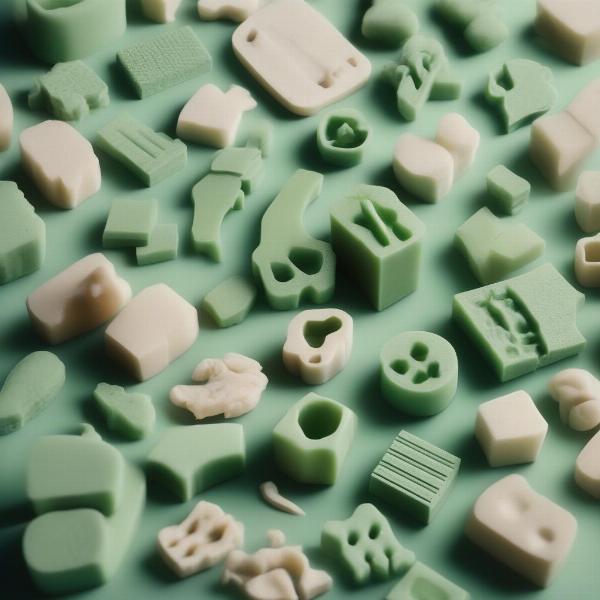Dental blocks, often marketed as a convenient way to maintain your dog’s oral hygiene, have become increasingly popular. But are they truly effective? This guide delves into the world of dental blocks for dogs, exploring their benefits, drawbacks, and how they fit into a comprehensive dental care routine. We’ll examine different types of dental blocks, how they work, and what to look for when choosing the right one for your furry friend. Understanding the nuances of canine dental health is crucial for responsible pet ownership, and this guide aims to provide you with the knowledge you need.
Understanding the Role of Dental Blocks in Dog Dental Care
 Various Dental Blocks for Dogs
Various Dental Blocks for Dogs
Just like humans, dogs are susceptible to dental issues like plaque buildup, tartar, gingivitis, and even periodontal disease. While brushing remains the gold standard for dog dental care, dental blocks can offer a supplementary approach to cleaning teeth and freshening breath. They work by encouraging chewing, which can help scrape away plaque and tartar. Some blocks also contain ingredients that help break down plaque or inhibit bacterial growth. However, it’s important to remember that dental blocks are not a replacement for regular brushing. healthy paws dog food
Types of Dental Blocks for Dogs
Dental blocks come in a variety of forms, catering to different dog sizes, chewing habits, and dietary needs. Common types include:
- Abrasive Blocks: These blocks rely on their texture to mechanically remove plaque and tartar. They often have ridges and grooves designed to scrub the teeth as the dog chews.
- Treat-Based Blocks: These combine the cleaning action with the appeal of a treat, often incorporating flavors like beef, chicken, or mint.
- Ingredient-Specific Blocks: Some blocks are infused with ingredients like chlorophyll for breath freshening or enzymes to help break down plaque.
Choosing the Right Dental Block
Selecting the right dental block involves considering your dog’s size, chewing habits, and any existing dental conditions. For aggressive chewers, opt for durable blocks that won’t splinter or break easily. For dogs with sensitive teeth, softer blocks might be a better choice. Always consult with your veterinarian for personalized recommendations. They can advise on the most suitable block based on your dog’s specific needs. sonic hot dogs menu
Integrating Dental Blocks into Your Dog’s Routine
Dental blocks should be used as part of a comprehensive dental care plan. This includes regular brushing, professional dental cleanings, and a healthy diet.
How Often Should You Give Your Dog a Dental Block?
The frequency of dental block use depends on the specific product and your dog’s needs. Always follow the manufacturer’s instructions. Overuse can lead to digestive upset or excessive calorie intake.
Can Dental Blocks Replace Brushing?
No, dental blocks should not replace regular brushing. While they can be helpful in removing some plaque and tartar, brushing is much more effective in reaching all surfaces of the teeth.
Are Dental Blocks Safe for All Dogs?
Most dental blocks are safe for dogs, but there are some potential risks. Some dogs may be allergic to certain ingredients, and some blocks may pose a choking hazard for small dogs or aggressive chewers. Always supervise your dog when they are chewing on a dental block. freeze dried raw diet for dogs
“Regular dental care is crucial for a dog’s overall health,” says Dr. Emily Carter, DVM. “While dental blocks can be a helpful addition to a dental hygiene routine, they are not a substitute for brushing and professional cleanings.”
“Remember,” adds Dr. Carter, “choosing the right dental block depends on individual factors like size, chewing habits, and any existing dental conditions. Always consult your veterinarian for personalized recommendations.”
Conclusion
Dental blocks can be a valuable tool in maintaining your dog’s oral hygiene, but they should be used in conjunction with other dental care practices like brushing and professional cleanings. Choosing the right block and using it correctly can contribute to a healthier, happier smile for your furry friend. Remember to always prioritize your dog’s health and consult your veterinarian for tailored advice on dental care. himalayan dog chew
FAQ
- Are dental blocks effective? While not as effective as brushing, they can help remove some plaque and tartar.
- Can puppies use dental blocks? Yes, but choose blocks specifically designed for puppies.
- What are the best dental blocks for small dogs? Look for smaller blocks or those designed for less aggressive chewers.
- Can dental blocks cause stomach upset? Overuse or ingredients like artificial sweeteners can cause digestive issues.
- How do I know if my dog is allergic to a dental block? Watch for signs like vomiting, diarrhea, or skin irritation.
- Can dental blocks replace professional cleaning? No, professional cleanings are essential for removing tartar below the gum line.
- Where can I buy dental blocks for dogs? Pet stores, veterinary clinics, and online retailers.
ILM Dog is a leading international website dedicated to providing expert advice on all aspects of dog care. We offer valuable resources on breeds, health, training, nutrition, grooming, and much more. From puppy care to senior dog care, we’re here to help you every step of the way. Our expert team provides reliable, practical advice to dog owners worldwide, catering to all experience levels and cultural backgrounds. For personalized advice on dog dental care, reach out to us at [email protected] or call us at +44 20-3965-8624. ILM Dog is committed to helping you provide the best possible care for your canine companion.